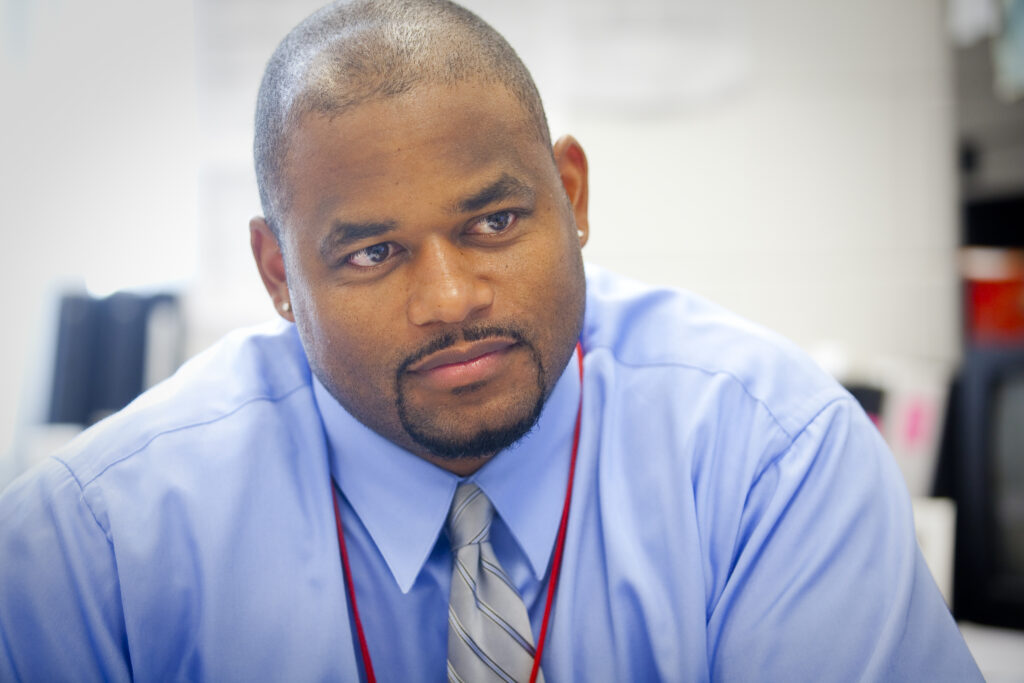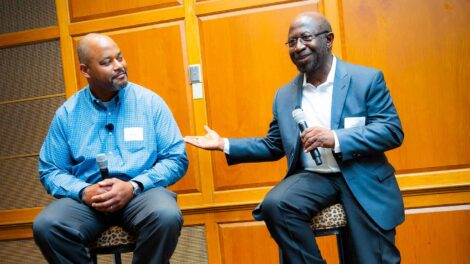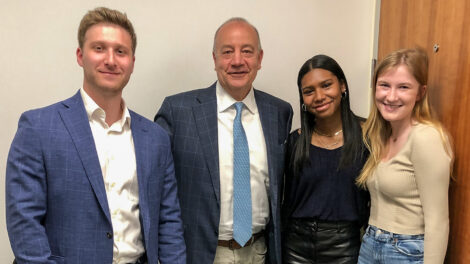Principal Harrison Bailey ’95 makes students’ mental health a priority
By Shannon Sigafoos
Pennsylvania Secondary School Principal of the Year. Co-founder of the Multicultural Student Leadership Conference. Frequent speaker on race and equity, and motivational leadership.
Harrison Bailey III ’95 may be described as many things. Of all the hats he has worn in the world of academia, however, he is most proud of two major accomplishments.
The first is leading Liberty High School in Bethlehem, Pa., to being named one of the leading trauma-informed high schools in the state. The second is creating a mental health and wellness center at the school that is staffed by mental health professionals and gives students a place to deal with their stressors.
We caught up with Bailey (who was honored at Lafayette’s Commencement ceremony in May) to discuss his road to working with high school educators, how Lafayette taught him a “relentless work ethic,” and how important it is for schools to understand the challenges of trauma and wellness.

Harrison Bailey III
Looking back on your Lafayette years, what about anthropology and sociology led you to the major?
During my second semester, I took a cultural anthropology course, and it really turned me on to talking about different cultures, how those cultures interact, and how people move in and out of those cultures. That particular course really opened my eyes to what it was I needed—and I didn’t even know what it was. I had a couple of professors who I just started to click with, who understood I was really interested in groups of people. And this evolved over time. Once I got a taste, that was it.
Did you have in your mind at all, at that point, your career would turn into what it is today?
Honestly, I didn’t. Even through obtaining my master’s degree, I had no intention of going into formal education. When I left Lafayette, I wanted to go into public speaking. I wanted to travel to colleges—and possibly high schools, as well—to speak to teams and organizations about rape, sexual harassment, and the male image in America. That’s what I wanted to do. Before I graduated, Prof.[Gladstone “Fluney”] Hutchinson called me into his office and asked me what I wanted to do. I told him what I was thinking, and his response was, ‘Why would any university hire you? Your ideas are all well and good, but you need to have some letters behind the name.’
“Why would they hire you?” is such an interesting question.
He was really the reason I decided to apply to graduate school. I was still living on campus that summer and into the next year, simultaneously trying out for pro football. I got a job at Lehigh University’s Centennial School, working as a one-on-one aide, and that was the first time I really got exposed to education as a career. I got my master’s degree while I was working at Centennial, taught for two years and knew I could connect with kids, but still felt teaching wasn’t the right fit for me. During my last class, a professor who had been a superintendent took me out for lunch and said he thought I should be in administration. So, I stayed at Centennial for another year and got my principalship certification.
How do you draw upon what you have learned through your own education to tackle the day-to-day responsibilities in your role?
My parents always raised me to believe the only thing in life that can’t be taken away from you is your education. I never knew there was another option besides going to college. This set the stage for me valuing education. And that, I think, impacts a lot of what I do now, in terms of guiding students. The education process has contributed to me being somewhat relentless. A relentless work ethic really hit me at Lafayette, which is where I learned how to struggle and learned that it wasn’t going to come easy. I had to buckle down, and I would say that still contributes to what I do today.
What do you find to be most rewarding about your career path?
It’s changed over time. I no longer serve kids in my position. I serve adults who serve kids. And when you don’t understand that, you don’t treat adults the way they need so they can care for kids. It’s knowing we’re feeling a connection to serving. I serve not just my teachers, but I serve custodians, I serve secretaries, I serve my administrative team. It’s getting that same feeling, but by serving the adults around me and seeing them now being able to flourish in doing their work. That’s a huge piece.
The other is the work we’ve done every year on trauma and the development of our Wellness Center. The work we’ve done here has really resonated. I think we’ve made a significant impact in this area, and we’ve definitely drawn a lot more attention to mental health in the state. We are all more sensitive about the impact of traumatic events, and we need to be cognizant of it in our interactions with others. I’m really proud of that, and I think we’ve been really blessed to be on the front end.

